-
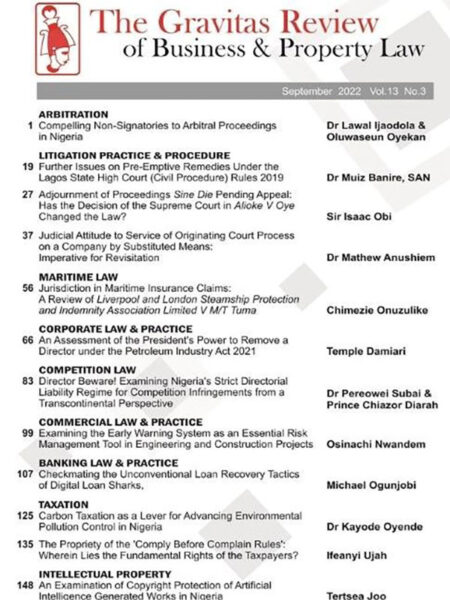
The Gravitas Review of Business & Property Law Vol.13 No.3 – Print
0₦5,000.00In this issue of The Gravitas Review of Business & Property Law Vol.13 No.3, there are well researched articles on:
- Arbitration
- Litigation Practice & Procedure
- Maritime Law
- Corporate Law & Practice
- Competition Law
- Commercial Law & Practice
- Banking Law & Practice
- Taxation
- Intellectual Property
-

The Gravitas Review of Business & Property Law Vol.13 No.3 – E-Book
0₦5,000.00In this issue of The Gravitas Review of Business & Property Law Vol.13 No.3, there are well researched articles on:
- Arbitration
- Litigation Practice & Procedure
- Maritime Law
- Corporate Law & Practice
- Competition Law
- Commercial Law & Practice
- Banking Law & Practice
- Taxation
- Intellectual Property
-

The Gravitas Review of Business & Property Law Vol.13 No.3
0₦5,000.00In this issue of The Gravitas Review of Business & Property Law Vol.13 No.3, there are well researched articles on:
- Arbitration
- Litigation Practice & Procedure
- Maritime Law
- Corporate Law & Practice
- Competition Law
- Commercial Law & Practice
- Banking Law & Practice
- Taxation
- Intellectual Property
-
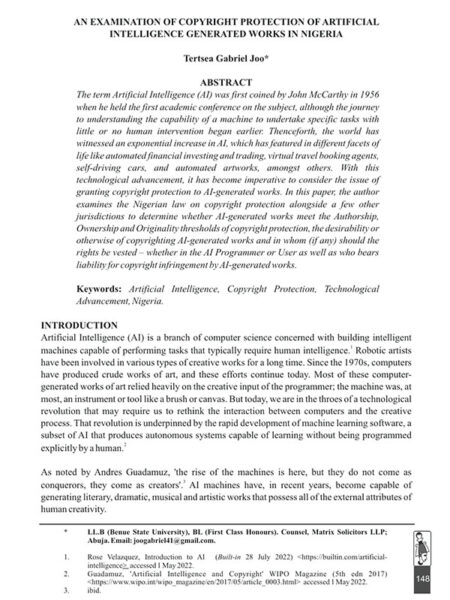
An Examination of Copyright Protection of Artificial Intelligence Generated Works in Nigeria
0₦2,500.00Tertsea Joo of Matrix Solicitors in his paper, An Examination of Copyright Protection of Artificial Intelligence Generated Works in Nigeria, notes that the world has witnessed an exponential increase in Artificial Intelligence (AI) which has featured in different facets of life like automated financial investing and trading, virtual travel booking agents, self-driving cars, and automated artworks, amongst others. With this technological advancement, it has become imperative to consider the issue of granting copyright protection to AI-generated works. Tertsea examines the Nigerian law on copyright protection alongside a few other jurisdictions to determine whether AI-generated works meet the Authorship, Ownership and Originality thresholds of copyright protection, the desirability or otherwise of copyrighting AI-generated works and in whom the rights should be vested – whether in the AI Programmer or User as well as who bears liability for copyright infringement by AI-generated works.
-
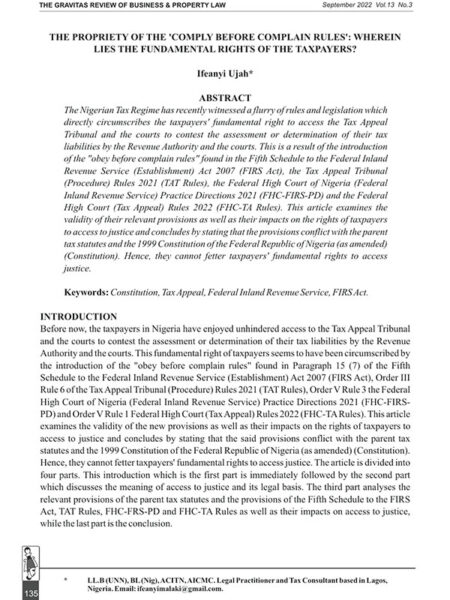
The Propriety of the ‘Comply Before Complain Rules’: Wherein Lies the Fundamental Rights of the Taxpayers?
0₦2,500.00Ifeanyi Ujah, a legal practitioner and tax consultant, in his article, The Propriety of the ‘Comply Before Complain Rules’: Wherein Lies the Fundamental Rights of the Taxpayers? observes that there has recently been a flurry of rules and legislation which directly circumscribes the taxpayers’ fundamental right to access the Tax Appeal Tribunal and the courts to contest the assessment or determination of their tax liabilities. This is a result of the introduction of the “obey before complain rules” found in the Fifth Schedule to the Federal Inland Revenue Service (Establishment) Act 2007 (FIRS Act), the Tax Appeal Tribunal (Procedure) Rules 2021 (TAT Rules), the Federal High Court of Nigeria (Federal Inland Revenue Service) Practice Directions 2021 (FHC-FIRS-PD) and the Federal High Court (Tax Appeal) Rules 2022 (FHC-TA Rules). Ujah examines the validity of these provisions as well as their impact on the rights of taxpayers to access justice.
-
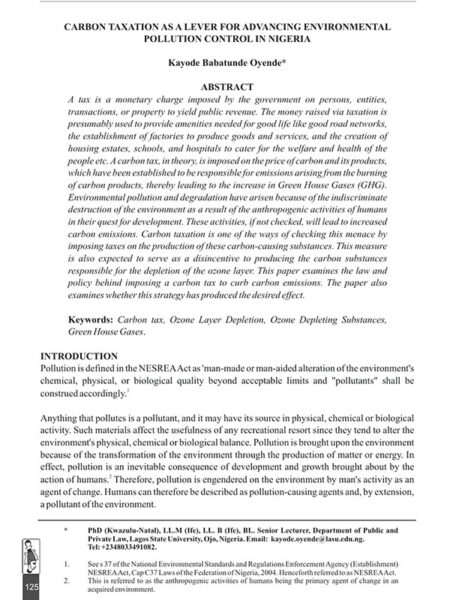
Carbon Taxation as a Lever for Advancing Environmental Pollution Control in Nigeria
0₦2,500.00Dr Kayode Oyende, Senior Lecturer, Department of Public and Private Law, Lagos State University, Nigeria in his article, Carbon Taxation as a Lever for Advancing Environmental Pollution Control in Nigeria, explains that a carbon tax is imposed on the price of carbon and its products, which have been established to be responsible for emissions arising from the burning of carbon products, thereby leading to the increase in Green House Gases. Dr Oyende notes that environmental pollution and degradation have arisen because of the indiscriminate destruction of the environment due to the anthropogenic activities of humans in their quest for development. These activities, if not checked, will lead to increased carbon emissions. Carbon taxation is one of the ways of checking this menace by imposing taxes on the production of these carbon-causing substances.
-
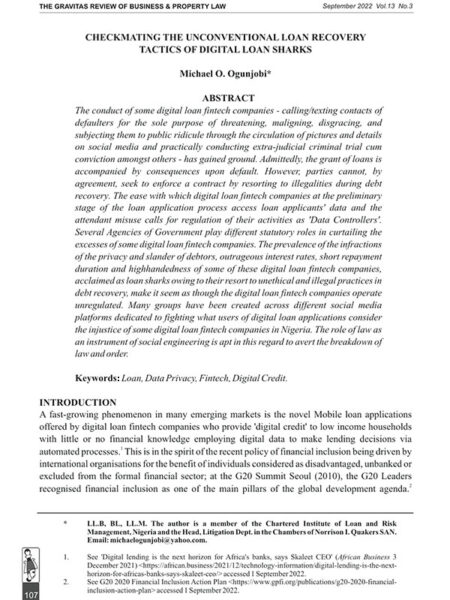
Checkmating the Unconventional Loan Recovery Tactics of Digital Loan Sharks
0₦2,500.00Michael Ogunjobi of the Chambers of Norrison I. Quakers SAN, and member of the Chartered Institute of Loan and Risk Management, Nigeria, in his article, Checkmating the Unconventional Loan Recovery Tactics of Digital Loan Sharks, notes that the conduct of some digital loan fintech companies – calling/texting contacts of defaulters for the sole purpose of threatening, accusing, disgracing, and subjecting them to public ridicule through the circulation of pictures and details on social media and practically conducting extra-judicial criminal trial cum conviction amongst others – has gained ground. Admittedly, the grant of loans is accompanied by consequences upon default. However, parties cannot, by agreement, seek to enforce a contract by resorting to illegalities during debt recovery. Ogunjobi examines the legal and regulatory framework of operation of digital loan fintech companies in Nigeria and steps that can be taken by both the authorities and consumers to checkmate their hideous loan recovery practices.
-
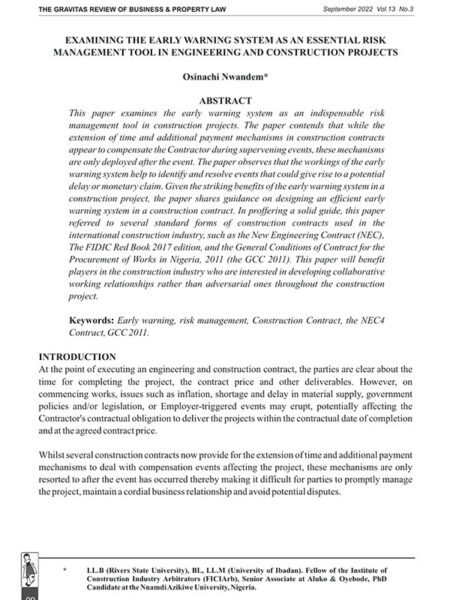
Examining the Early Warning System as an Essential Risk Management Tool in Engineering and Construction Projects
0₦2,500.00Osinachi Nwandem, Senior Associate Aluko & Oyebode and Fellow of the Institute of Construction Industry Arbitrators, in his article, Examining the Early Warning System as an Essential Risk Management Tool in Engineering and Construction Projects, considers the early warning system as an indispensable risk management tool in construction projects. He contends that while the extension of time and additional payment mechanisms in construction contracts appear to compensate the Contractor during supervening events, these mechanisms are only deployed after the event. Nwandem observes that the workings of the early warning system help to identify and resolve events that could give rise to a potential delay or monetary claim. Given the striking benefits of the early warning system in a construction project, he shares guidance on designing an efficient early warning system in a construction contract.
-
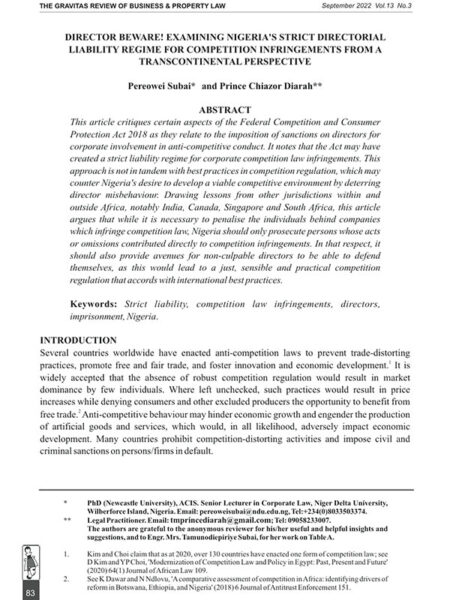
Director Beware! Examining Nigeria’s Strict Directorial Liability Regime for Competition Infringements from a Transcontinental Perspective
0₦2,500.00Dr Pereowei Subai, Senior Lecturer in Corporate Law at the Niger Delta University, Wilberforce Island, Nigeria and Prince Chiazor Diarah in their article, Director Beware! Examining Nigeria’s Strict Directorial Liability Regime for Competition Infringements from a Transcontinental Perspective, critique certain aspects of the Federal Competition and Consumer Protection Act 2018 (FCCPA) as they relate to the imposition of sanctions on directors for corporate involvement in anticompetitive conduct. They note that the FCCPA seems to have created a strict liability regime for corporate competition law infringements. This approach is not in tandem with best practices in competition regulation which may be counterproductive to Nigeria’s desire to develop a viable competitive environment by deterring directors’ misbehaviour. Drawing lessons from other jurisdictions within and outside Africa, the authors argue that while it is necessary to penalise the individuals behind companies which infringe competition law, Nigeria should only prosecute persons whose acts or omissions contributed directly to competition infringements.
-
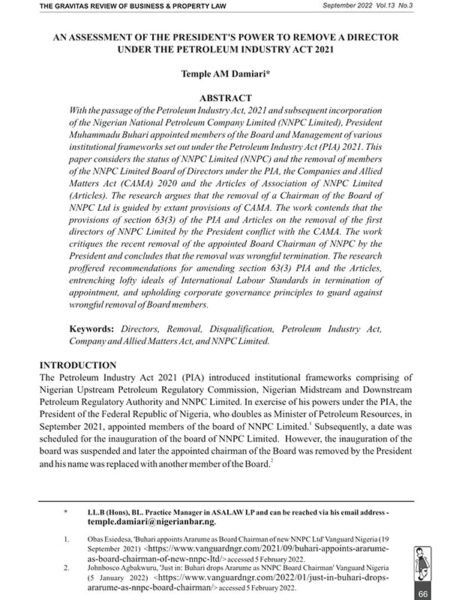
An Assessment of the President’s Power to Remove a Director under the Petroleum Industry Act 2021
0₦2,500.00Temple Damiari of ASALAW LP, in his paper, An Assessment of the President’s Power to Remove a Director under the Petroleum Industry Act 2021, notes that with the passage of the Petroleum Industry Act 2021 and subsequent incorporation of the Nigerian National Petroleum Company Limited (NNPC Limited), President Muhammadu Buhari appointed members of the Board and Management of various institutional frameworks set out under the Petroleum Industry Act (PIA) 2021. Damiari considers the status of NNPC Limited and the removal of members of NNPC Limited Board of Directors under the PIA, the Companies and Allied Matters Act (CAMA) 2020 and Articles of Association of NNPC Limited (Articles). He argues that extant provisions of CAMA guide the removal of a Chairman of the Board of NNPC Ltd. He contends that the provisions of section 63(3) of the PIA and Articles on the removal of the first directors of NNPC Limited by the President conflict with the CAMA. He critiques the recent removal of the appointed Board Chairman of NNPC by the President and concludes that the removal was wrongful termination.
-
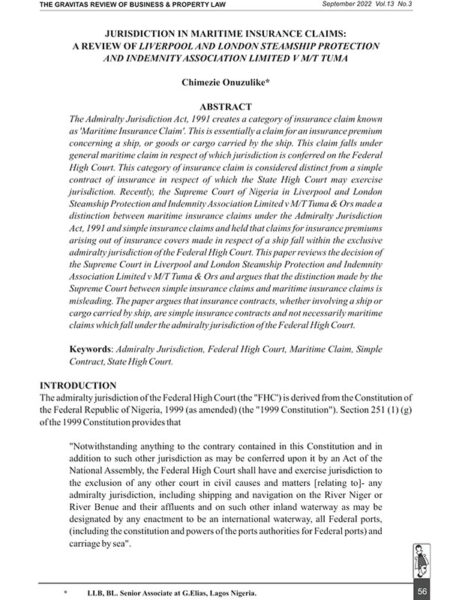
Jurisdiction in Maritime Insurance Claims: A Review of Liverpool and London Steamship Protection and Indemnity Association Limited V M/T Tuma
0₦2,500.00Chimezie Onuzulike, Senior Associate at G. Elias, in his article, Jurisdiction in Maritime Insurance Claims: A Review of Liverpool and London Steamship Protection and Indemnity Association Limited V M/T Tuma, explains that the Admiralty Jurisdiction Act 1991 creates a category of insurance claim known as ‘Maritime Insurance Claim’. This is essentially a claim for an insurance premium concerning a ship, or goods or cargo carried by the ship. This claim falls under general maritime claim in respect of which jurisdiction is conferred on the Federal High Court. This category of insurance claim is considered distinct from a simple contract of insurance in respect of which the State High Court may exercise jurisdiction. Recently, the Supreme Court of Nigeria in Liverpool and London Steamship Protection and Indemnity Association Limited v M/T Tuma made a distinction between maritime insurance claims under the Admiralty Jurisdiction Act 1991 and simple insurance claims and held that claims for insurance premiums arising out of insurance covers made in respect of a ship fall within the exclusive admiralty jurisdiction of the Federal High Court. Chimezie brilliantly reviews the decision of the Supreme Court in that case and argues that the distinction made by the Supreme Court between simple insurance claims and maritime insurance claims is misleading. He argues that insurance contracts, whether involving a ship or cargo carried by a ship, are simple insurance contracts and not necessarily maritime claims which fall under the admiralty jurisdiction of the Federal High Court.
-
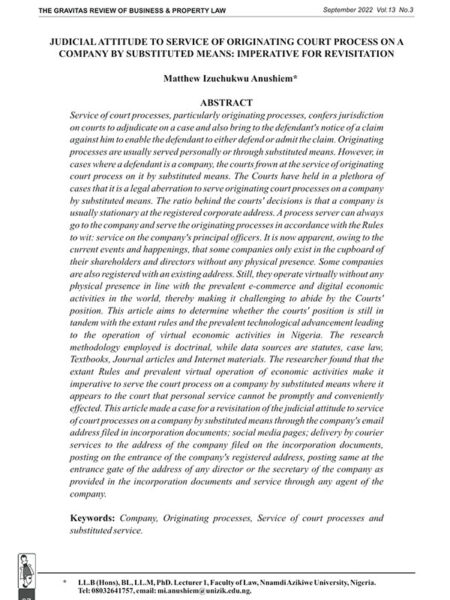
Judicial Attitude to Service of Originating Court Process on a Company by Substituted Means: Imperative for Revisitation
0₦2,500.00Dr Mathew Anushiem of the Faculty of Law, Nnamdi Azikiwe University, Nigeria, in his article, Judicial Attitude to Service of Originating Court Process on a Company by Substituted Means: Imperative for Revisitation, explains that the service of court processes, particularly originating processes, confers jurisdiction on courts to adjudicate on a case and also bring to the defendant’s notice of a claim against him to enable the defendant to either defend or admit the claim. Originating processes are usually served personally or through substituted means. However, in cases where a defendant is a company, the courts frown at the service of originating court process on it by substituted means. The ratio behind the courts’ decisions is that a company is usually stationary at the registered corporate address. A process server can always go to the company and serve the originating processes in accordance with the Rules to wit: service on the company’s principal officers. Given current happenings, the nature of some businesses and technological advancement, Dr Anushiem posits that there is the need to revisit the Rules and judicial attitude to bring them in tandem with modern trends.
The Gravitas Review of Business & Property Law



